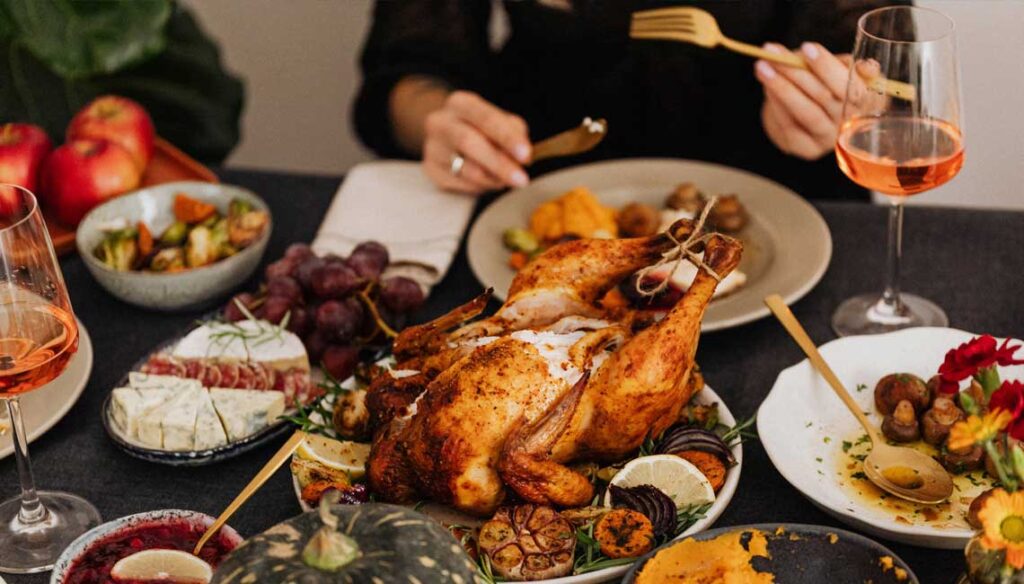
We have gratitude to the things that are gone.
Gaby Pérez Islas
The origin of Thanksgiving Day goes back to the stories that coincide with the real events experienced by the Puritan settlers of Plymouth, present-day Massachusetts, when they had their first corn harvest, after receiving the help of the native peoples to overcome the adversities of the harsh autumn they faced in 1621.
The practitioners of the Protestant religion performed frequent ceremonies of thanksgiving to God for the ephemeral goodness received in this world; it is said that, as a gesture of friendship and gratitude, the colonists invited the Indians to a meal. This can be imagined as a great picnic where they shared the endemic foods of the New World: turkeys, green beans, corn, potatoes, sweet potatoes, pumpkins, and nuts. This event is celebrated to this day and is the most important national holiday of the year in the United States.
On November 26, 1789, after the union of the Thirteen Colonies, President George Washington established this celebration as an official and public prayer. The values he emphasized were gratitude, freedom, peace, and prosperity of the new country.
In 1863, Abraham Lincoln issued a proclamation to establish the 4th Thursday in November as Thanksgiving Day, and, since 1941, it has been a holiday weekend. In 1963, President John F. Kennedy initiated the peculiar turkey pardoning ceremony, in which a bird’s life is spared each year. A variety of desserts have been added to the succulent menu of this important dinner, and it is essential to follow the National Football League season, which offers exciting games.
Another interesting tradition is the parade initiated by Macy’s department store in New York City, which, since 1927, has taken to the streets with its giant balloons, floats, and guest performers. In the city of Houston, this popular activity is replicated with the H-E-B Parade.
However, the reality that gave rise to this tradition was very different: the colonists ignored the generosity that the Indians offered them and almost exterminated the native peoples. The proclaimed peace was violated in frequent wars and conflicts unwanted by the nation. For this reason, American families try every year to renew the values of this significant date, promoting the union around a table where food is of great importance. They promote peace and cordiality among fellow human beings and, above all, exalt gratitude as the highest value.
To be thankful for what we have now and not later. To be grateful because it makes us more conscious of what we have and of the value of the people we love. Gratitude should come from the deepest part of our being and has a relationship with happiness because it transforms the vision we have of life, and helps to overcome sadness, difficulties, and anguish.
A tradition that emerged in the Polynesian islands called ho’oponopono, which in its original language translates as correction, supervision, or mental hygiene, is a practice that focuses on problem-solving to avoid major conflicts between people. It starts with the family and continues with the whole of society.
In order to make this work, reconciliation and forgiveness are appealed to. Prayer dynamics and discussions are held where interpersonal relationships are ordered based on the social values of correct behavior. Sometimes it was believed that an illness could be cured with the forgiveness of the entire family because, according to this tradition, ailments are caused by people’s misconduct.
Saying phrases such as I’m sorry, thank you, I love you, are considered very powerful for healing. This was proven by Dr. Ihaleakala Hew Len, who was in charge of the health of inmates in a prison in Hawaii and who, when he studied the files of the prisoners, found the strong psychological disorders that led these people to commit crimes. So he began this ancient practice with himself and, in this way, restored inner peace to his patients by repeating these powerful phrases over and over again. Eventually, he added the adoption of pets to take care of and the practice of meditation inside the prison, both with very good results.
At Del Pueblo Funeral Home we join in the seasonal celebrations and highlight its deepest values. We believe that living with gratitude and, above all, expressing gratitude will lead to positive transformation. Thus, we remind you that we make the most difficult moments easy.
